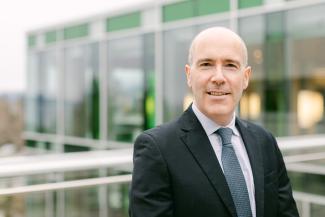
Dr. Adam Hofri-Winogradow is an expert on the law of trusts – and how trust laws should be reformed. On January 1, we were delighted to welcome him to the Peter A. Allard School of Law as an associate professor.
Among his current research projects, Dr. Hofri-Winogradow is examining how governments attempt to prevent the use of trusts to avoid taxation and otherwise evade the law. He’s also a co-editor on the forthcoming Oxford Handbook of Comparative Trust Laws. His research has been cited by social justice advocacy organizations such as the Tax Justice Network and the International Consortium of Investigative Journalists and quoted by international news sources, including the Washington Post.
Dr. Hofri-Winogradow joins us from the Hebrew University of Jerusalem, where he held the Montesquieu Chair in Comparative Law and Legal History. This term, he's teaching the law school’s upper-year course on Trusts.
In this Q&A, Dr. Hofri-Winogradow shares more about his research and what he’s looking forward to most at Allard and here in Vancouver, BC.
What are your research interests?
My research has long focused on trusts, including comparative, theoretical approaches to trust law, the historical development of trust law, and the social and economic functions of trusts.
I’m also interested in ways in which trusts are used by different sorts of clients – including cases where trusts are used as a tool for subverting other parts of the law. I’m also looking at different jurisdictions' recent dramatic reforms to their law of trusts and at how, seeking to make their law more client- and practitioner-friendly, many jurisdictions reform their laws of trusts so as to turn it into a tool of great injustice.
Tell us about your current research projects.
Because trusts are often used to subvert the law and avoid taxation, anti-avoidance rules can be an important mechanism for preventing the abuse of such legal loopholes. Such rules do not, however, always prevent the subversive use of trusts completely.
I’m also interested in ways in which trusts are used by different sorts of clients – including cases where trusts are used as a tool for subverting other parts of the law.
So, one project I’m pursuing, together with Professor Mark Bennett of the Victoria University of Wellington, New Zealand, examines laws that are designed to counter the use of trusts for subverting the law – for example, in cases related to the distribution of property in the event of divorce or separation. Some laws actually assume the subversive use of trusts and build on that use. We study the interplay of subverted norms, subverting trusts and anti-avoidance norms across three legal topics: the distribution of property in the event of divorce or separation, entitlement to welfare benefits and the income tax consequences of settlors controlling trusts they created. We identify how this interplay came into existence in each jurisdiction and theorize legislatures’ diverse responses to the subversive uses of trusts.
In another project, I’m working with Dr. Inbal Maimon-Blau to examine how the Israeli commercial court received the so-called Business Judgment Rule from the State of Delaware into the law of Israel, despite the absence of any legislative mandate for doing so. In practice, this rule works to protect directors and executives from scrutiny or liability, by presupposing that their business decisions were reasonable. Having studied the Israeli commercial court’s gradual reception and broad application of this rule, we explore how commercial courts can offer a gold-plated, privileged exception to the rest of the legal system, melding procedural privilege – quick, expert adjudication – with substantive privilege. Pieces of the law of Delaware are often received into the law of other jurisdictions at the request of the local business community, with little attention paid to whether the imported, made-in-Delaware norms fit the local law.
I’m also working on a new Oxford Handbook of Comparative Trust Laws. I’m an editor of this volume, together with Professor Mark Bennett, Professor Lusina Ho of the University of Hong Kong and Professor Richard Nolan of the University of York, UK. This Handbook will be the most comprehensive resource available covering the development of trust law and practice worldwide, as well as the social and economic implications of that development. Intended for legal academics, policymakers, legal practitioners, law students and others curious about the rapid reform of this influential branch of the law, the Handbook will provide up-to-date information, commentary and recommendations regarding the current state of the law of trusts.
The Handbook will, I hope, be celebrated in a large-scale international conference to be held at Allard Hall in spring 2024.
What do you look forward to most about being a part of the Allard community?
The wonderful collegiality characteristic of the school, the great students, the opportunity to study trusts in an environment producing large amounts of sophisticated trusts case law, and of course the wonderful Vancouver weather and food!


